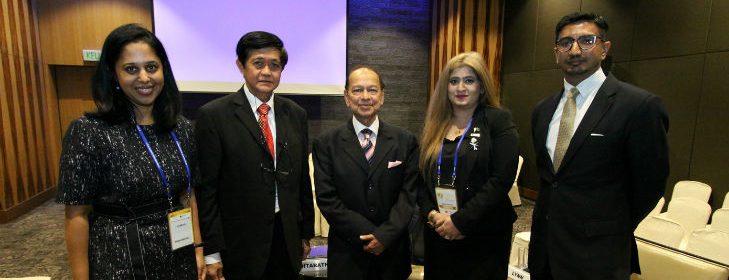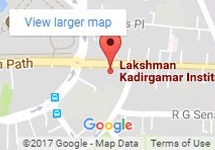
Reading Time: 5 min read
Dr. Dinusha Panditaratne, Executive Director of LKI, was invited to speak at the 32nd annual Asia-Pacific Roundtable (APR), held from the 7-9 May 2018 in Kuala Lumpur. Hosted by the Institute of Strategic and International Studies (ISIS) Malaysia and the ASEAN Institutes of Strategic and International Studies (ASEAN-ISIS). The three-day event brought together a diverse audience from the region’s think tanks, governments and diplomatic community, and academic networks.
This year’s APR was themed ‘Disruption: People. Technology. Power. Security.’ Dr. Panditaratne spoke at the session of the conference titled ‘Strategic Update: South Asia’, which focused on recent developments and the current situation in South Asian countries that merit attention by the policymaking community.
In her remarks, Dr. Panditaratne noted that Sri Lanka’s external relations are being driven by three key needs: (1) economic development; (2) security and regional stability; and (3) post-war domestic stability and community building. Her presentation outlined aspects of each of these three needs, including the (i) main objective, (ii) current situation, (iii) principal foreign partners, (iv) future plans, and (v) other aspects or possibilities.
Economic development
On economic development, the main objective has been to capitalise on Sri Lanka’s post-war status for growth and as a related matter, manage the national debt, which is currently around 80% of GDP. Dr. Panditaratne observed that, contrary to reports of ‘debt-trap diplomacy’ that Sri Lanka owes much of its debt to China, recent figures indicate that Sri Lanka owes approximately USD 3.8 bn to China, which is less than 6% of national debt (around the same as what it owes to Japan); with however, another USD 2.1 bn in the pipeline. In terms of current performance, 2017 was a positive year for exports (helped by regaining GSP+ for exports to the European Union) and recorded the highest-ever foreign direct investment (FDI). Sri Lanka recently signed a free trade agreement (FTA) with Singapore, its first in over a decade. Conversely, however, GDP growth slowed markedly to 3.1% in 2017.
As for its principal partners, China has been the key partner in developing Sri Lanka’s ports and other infrastructure (for which it was previously given or promised freehold title in some projects, while the present government has shifted to leasehold arrangements). Of the USD 1.9 bn FDI in 2017, more than USD 900 mn came from China, including Hong Kong. In future, Sri Lanka is trying to widen its investment base, including by (a) a broader strategy of rebranding itself as a maritime and financial “centre of the Indian Ocean” (to add to its South Asian identity), complemented by a network of FTAs beyond South Asia, and (b) seeking able partners for future development projects e.g. India and Japan for a LNG terminal.
Dr. Panditaratne noted that concluding the trade agreement (ETCA) with India will be a key test; the examples of Singapore, New Zealand, Netherlands and Denmark show that good economic relations with large neighbouring states are integral to a smaller state’s success. Another test will be whether Sri Lanka can accelerate its current move to a user-friendly, rules-based system for investment, which can attract more export-driven FDI and tie infrastructure-driven investment from China and elsewhere to a transparent normative framework.
Security and regional stability
The main objective in security arrangements and regional stability has been to manage or ‘balance’ the strategic competition between China and India insofar as it could affect Sri Lanka, especially given the apparent retreat of singular US leadership in the region. Dr. Panditaratne noted that India has recently overtaken France to join the ranks of the world’s top five spenders on military expenditure. The current government has focused on ‘rebalancing’ Sri Lanka’s strategic partnerships, indicated by, for example, the reported refusal of a Chinese submarine visit in 2017, in contrast to the docking of such a vessel in 2014. Nevertheless, India and other countries have expressed concern about the possible ‘dual use’ of Sri Lankan ports, notwithstanding official denials of use for military purposes. Public transparency about the port agreements is important to address these concerns.
Sri Lanka is supporting and building normative frameworks in the Indian Ocean in several ways.
As to Sri Lanka’s principal partners for security and regional stability, Sri Lanka engages extensively with India, and at a significantly lower level with China. This is indicated by, for example, the annual Defence Dialogue and joint “Mitra Shakti” military exercises between India and Sri Lanka. Of around 400 naval visits between 2009 and 2017, the most number of ships were from India, followed by Japan, and then China. To enhance security and regional stability in the future, Sri Lanka is supporting and building normative frameworks in the Indian Ocean in several ways. Sri Lanka is leading the Working Group on Maritime Safety and Security of the Indian Ocean Rim Association (IORA), it will take over in 2018 as chair of the Bay of Bengal Initiative for Multi-Sectoral Technical and Economic Cooperation (BIMSTEC), and Colombo will be the seat of the Global Maritime Crime Programme of UN Office on Drugs and Crime (UNODC) from May 2018.
Other possibilities include a future normative statement on the Indian Ocean, an idea that is in the interest of regional powers, as it will help build the trust of smaller states about competing frameworks like a ‘Free and Open Indo-Pacific’ and the Belt and Road Initiative. Dr. Panditaratne referred to a survey conducted for LMD, a business magazine in Sri Lanka, indicating a need to build local trust and confidence in key partners. Of those surveyed in Sri Lanka, one-quarter (26%) agreed with the statement that India can be relied on in the long term; more but only half (51%) said the same of China. Almost three-quarters (72%) believed that China is key to Sri Lanka’s progress; while 42% said the same of India.
Domestic stability
On domestic stability, the primary objective has been to maintain post-war peace; which has been pursued with varying levels of commitment to pluralism and to improving the rule of law. The questions of what kind of post-war society Sri Lanka wants to build, and whom it includes, remain relatively unaddressed at a domestic (as opposed to an international) level, with a few notable exceptions. Nationalist sentiment appears to have displaced some of the pluralist agenda that was evident in 2015, an issue related to the underlying difficulties of coalition governance.
With regard to its principal partners, western states have been strong supporters of the task of building a reconciled, pluralist, rights-friendly democracy in Sri Lanka. China appears to be increasing its ‘Buddhist diplomacy’ in Sri Lanka; the net impact of this soft power measure for domestic stability is unclear and should be monitored. Rather than mirroring religious diplomacy initiatives, India has an opportunity for a more visionary normative role. It could shift some of its present preoccupation with security-related ‘great power’ issues to promoting its defining difference with China in the neighborhood; which is India’s status as a common-law, constitutional democracy. India has shown signs of this role in the recent past – for example, when its Prime Minister did not attend the Commonwealth Heads of Government Meeting (CHOGM) in Sri Lanka in 2013 – and there is now arguably a bigger window for India’s normative leadership, in its neighborhood and beyond.
About the panel
Other experts on the panel included Dr. Maria Sultan, President of the South Asian Strategic Stability Institute University in Pakistan; Mr. Dhruva Jaishankar, Fellow at Brookings India; and Dr. Iftekhar Ahmed Chowdhury, Principal Research Fellow at the Institute of South Asian Studies, National University of Singapore and former Foreign Minister of Bangladesh. The panel was chaired by U Khin Maung Lynn, Joint Secretary of the Myanmar Institute of Strategic and International Studies and Myanmar’s former Ambassador to the United Nations in New York.
Photo Credits: Institute of Strategic and International Studies, Malaysia



